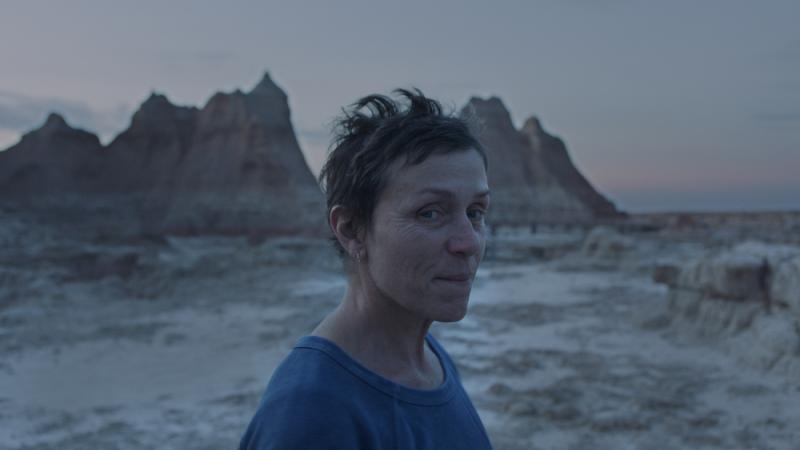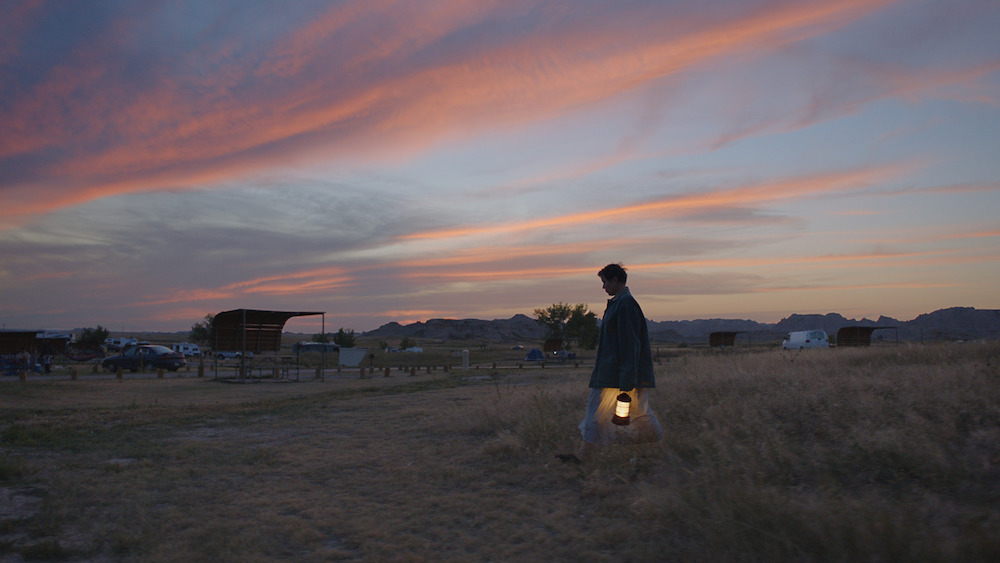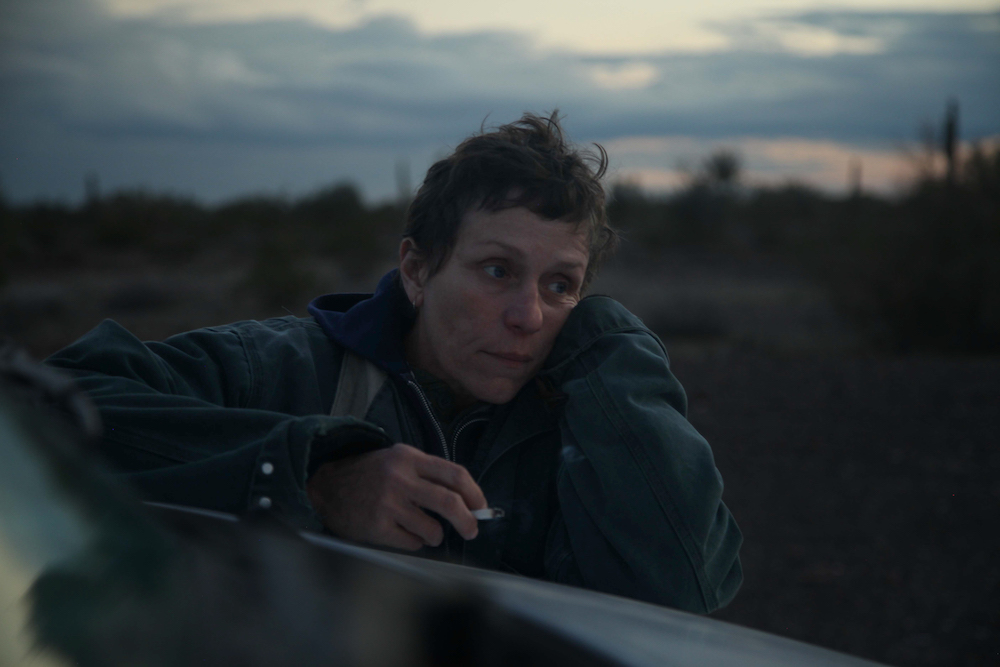Nomadland review - on the road in the American West | reviews, news & interviews
Nomadland review - on the road in the American West
Nomadland review - on the road in the American West
Frances McDormand shines in Chloé Zhao's Oscar-scooping third feature

Fern (a luminous Frances McDormand) used to work in HR. Now, aged 62, she’s harvesting sugarbeets, hauling rocks, cleaning toilets in a trailer park and doing shifts in an Amazon warehouse. And she’s living out of her camper van, a shabby, lovingly restored RV she calls Vanguard. “I’m not homeless, I’m houseless,” she says, driving through vast Western landscapes under spectacular skies.
Chloé Zhao’s hypnotically beautiful, multi-award-winning third feature builds on the same docu-fiction MO as her extraordinary The Rider (2017) and Songs My Brother Taught Me (2015) where she used non-professional actors playing versions of themselves and built a script around their life stories.
In those films, her focus was on the Lakota Sioux of the Pine Ridge Reservation in South Dakota; in Nomadland, using the same director of photography, her partner Joshua James Richards, it’s on the itinerant work force made up of senior citizens who, since the financial crash, can’t afford to retire. This is a growing demographic, documented by Jessica Bruder in her book Nomadland: Surviving America in the Twenty-first Century, which was optioned in 2019 by Frances McDormand and producer Peter Spears and on which the film is loosely based, though without Bruder’s hard-hitting observations about the gig economy.
 Of course, in Nomadland the difference is that Zhao uses stars - Frances McDormand (famously private and determinedly unglamorous, she’s hardly a typical Hollywood icon, which makes her ideal for inhabiting the role) and David Strathairn as the mild-mannered Dave with a crush on Fern – alongside the non-professional, real-life van dwellers playing themselves, such as 75-year-old Swankie, who gives Fern a lecture about having no spare tyre and reveals that she has terminal cancer. She gives away all her belongings and heads off to Alaska, a copy of Final Exit in hand.
Of course, in Nomadland the difference is that Zhao uses stars - Frances McDormand (famously private and determinedly unglamorous, she’s hardly a typical Hollywood icon, which makes her ideal for inhabiting the role) and David Strathairn as the mild-mannered Dave with a crush on Fern – alongside the non-professional, real-life van dwellers playing themselves, such as 75-year-old Swankie, who gives Fern a lecture about having no spare tyre and reveals that she has terminal cancer. She gives away all her belongings and heads off to Alaska, a copy of Final Exit in hand.
Linda May, another greying nomad and one of Fern’s friends and co-workers at Amazon’s CamperForce, a brigade of RV-dwelling, elderly seasonal staff (free parking provided), encourages Fern to come to the Rubber Tramp Rendezvous in Quartzsite, Arizona, led by white-bearded guru Bob Wells, a master of the arts of on-the-road survival. There she finds a welcoming community, resilient, rootless, all seizing the day. Later she and Linda May sit back on their folding chairs, sheet masks on their faces, a beauty salon of their own out in the desert.
This slow-moving, poetic film (Fern’s rendition of "Shall I compare Thee to a Summer’s Day?” brings a tear to the eye), its gentle soundtrack mainly by Einaudi, starts and ends with a storage unit in Empire, Nevada, the town where she lived with her late husband Beau, who worked for the gypsum mine. Their tract house had a view of the endless desert and they were happy there. But in 2011 US Gypsum Corp closed the mine and left behind a shuttered ghost town. Even Empire’s zip code was discontinued. Eventually, unable to find work, Fern's only option is to become a nomad.
But she's undaunted. This is Frances McDormand as we’ve never seen her, a world away from Three Billboards Outside Ebbing, Missouri, Fargo or Olive Kitteridge: meditative, youthful, skipping lightly over the surreal pink rocks at sunset in Badlands National Park in South Dakota, watched from a distance by the ever-hopeful Dave.
Nomadland has been criticised for its rosy portrayal of Amazon’s work-life balance. Certainly the immense Nevada warehouse - quite a coup to get access for filming - where Fern and Linda May do their Christmas shifts, walking for miles, scanning bar codes and sealing boxes, seems full of camaraderie rather than exhaustion with no bathroom breaks.
Zhao says she’s an observer and doesn’t judge. Instead she focuses – a soft focus - on the American pioneer spirit and the choice these pensionless pensioners have made to reject corporate America, however uncomfortable, cold and lonely their lives may be at times. Freedom’s just another word for nothing left to lose, and you wait for Fern to get sick with no health insurance or to be ambushed by marauders. But the most jolting incident is a guard telling her she can’t park overnight (she obviously hadn’t taken Bob Well’s tips for stealth parking on board). Not much of a harsh underbelly here. Instead, kindness wins the day.
 When her van breaks down, Fern has to ask her sister (Melissa Smith) for a loan. “You’re being a bitch,” she says when Dolly refuses to wire her the money. Fern returns to civilisation twice: to Dolly’s house to borrow the cash, where she’s plunged into real-estate chat at a suburban barbecue – “It’s strange that you encourage people to go into debt and buy a house they can’t afford,” she remarks, to an awkward silence - and on a Thanksgiving visit to Dave, who’s given up the open road to live with his son’s young family in California. For a second, it looks as if she may stay on. But, prickly and unforthcoming, she can’t get comfortable in a bed and has to retreat to sleep in her van. In an indelible scene on her final morning, she sits with her back turned, alone at the dining-table, knowing that this enclosed life is not for her.
When her van breaks down, Fern has to ask her sister (Melissa Smith) for a loan. “You’re being a bitch,” she says when Dolly refuses to wire her the money. Fern returns to civilisation twice: to Dolly’s house to borrow the cash, where she’s plunged into real-estate chat at a suburban barbecue – “It’s strange that you encourage people to go into debt and buy a house they can’t afford,” she remarks, to an awkward silence - and on a Thanksgiving visit to Dave, who’s given up the open road to live with his son’s young family in California. For a second, it looks as if she may stay on. But, prickly and unforthcoming, she can’t get comfortable in a bed and has to retreat to sleep in her van. In an indelible scene on her final morning, she sits with her back turned, alone at the dining-table, knowing that this enclosed life is not for her.
The film’s elegiac quality – death and loss are never far from these nomads’ thoughts - culminates in Swankie’s memorial in the desert. Everyone throws rocks on to a blazing fire, as she’d requested. “There’s no final goodbye in life. I’ll see you down the road,” says Bob Wells, and Nomadland is dedicated to “the ones who had to depart”. Watch on the big screen, if you can. Those skies deserve it.
The future of Arts Journalism
You can stop theartsdesk.com closing!
We urgently need financing to survive. Our fundraising drive has thus far raised £49,000 but we need to reach £100,000 or we will be forced to close. Please contribute here: https://gofund.me/c3f6033d
And if you can forward this information to anyone who might assist, we’d be grateful.

Subscribe to theartsdesk.com
Thank you for continuing to read our work on theartsdesk.com. For unlimited access to every article in its entirety, including our archive of more than 15,000 pieces, we're asking for £5 per month or £40 per year. We feel it's a very good deal, and hope you do too.
To take a subscription now simply click here.
And if you're looking for that extra gift for a friend or family member, why not treat them to a theartsdesk.com gift subscription?
more Film
 The Mastermind review - another slim but nourishing slice of Americana from Kelly Reichardt
Josh O'Connor is perfect casting as a cocky middle-class American adrift in the 1970s
The Mastermind review - another slim but nourishing slice of Americana from Kelly Reichardt
Josh O'Connor is perfect casting as a cocky middle-class American adrift in the 1970s
 Springsteen: Deliver Me From Nowhere review - the story of the Boss who isn't boss of his own head
A brooding trip on the Bruce Springsteen highway of hard knocks
Springsteen: Deliver Me From Nowhere review - the story of the Boss who isn't boss of his own head
A brooding trip on the Bruce Springsteen highway of hard knocks
 The Perfect Neighbor, Netflix review - Florida found-footage documentary is a harrowing watch
Sundance winner chronicles a death that should have been prevented
The Perfect Neighbor, Netflix review - Florida found-footage documentary is a harrowing watch
Sundance winner chronicles a death that should have been prevented
 Blu-ray: Le Quai des Brumes
Love twinkles in the gloom of Marcel Carné’s fogbound French poetic realist classic
Blu-ray: Le Quai des Brumes
Love twinkles in the gloom of Marcel Carné’s fogbound French poetic realist classic
 Frankenstein review - the Prometheus of the charnel house
Guillermo del Toro is fitfully inspired, but often lost in long-held ambitions
Frankenstein review - the Prometheus of the charnel house
Guillermo del Toro is fitfully inspired, but often lost in long-held ambitions
 London Film Festival 2025 - a Korean masterclass in black comedy and a Camus classic effectively realised
New films from Park Chan-wook, Gianfranco Rosi, François Ozon, Ildikó Enyedi and more
London Film Festival 2025 - a Korean masterclass in black comedy and a Camus classic effectively realised
New films from Park Chan-wook, Gianfranco Rosi, François Ozon, Ildikó Enyedi and more
 After the Hunt review - muddled #MeToo provocation
Julia Roberts excels despite misfiring drama
After the Hunt review - muddled #MeToo provocation
Julia Roberts excels despite misfiring drama
 Ballad of a Small Player review - Colin Farrell's all in as a gambler down on his luck
Conclave director Edward Berger swaps the Vatican for Asia's sin city
Ballad of a Small Player review - Colin Farrell's all in as a gambler down on his luck
Conclave director Edward Berger swaps the Vatican for Asia's sin city
 London Film Festival 2025 - Bradley Cooper channels John Bishop, the Boss goes to Nebraska, and a French pandemic
... not to mention Kristen Stewart's directing debut and a punchy prison drama
London Film Festival 2025 - Bradley Cooper channels John Bishop, the Boss goes to Nebraska, and a French pandemic
... not to mention Kristen Stewart's directing debut and a punchy prison drama
 London Film Festival 2025 - from paranoia in Brazil and Iran, to light relief in New York and Tuscany
'Jay Kelly' disappoints, 'It Was Just an Accident' doesn't
London Film Festival 2025 - from paranoia in Brazil and Iran, to light relief in New York and Tuscany
'Jay Kelly' disappoints, 'It Was Just an Accident' doesn't
 Iron Ladies review - working-class heroines of the Miners' Strike
Documentary salutes the staunch women who fought Thatcher's pit closures
Iron Ladies review - working-class heroines of the Miners' Strike
Documentary salutes the staunch women who fought Thatcher's pit closures
 Blu-ray: The Man in the White Suit
Ealing Studios' prescient black comedy, as sharp as ever
Blu-ray: The Man in the White Suit
Ealing Studios' prescient black comedy, as sharp as ever

Add comment